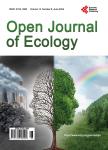Economic Valuation of Auctioned Tourist Hunting Blocks in Tanzania
Economic Valuation of Auctioned Tourist Hunting Blocks in Tanzania作者机构:Department of Trade and Investment College of Economics and Business Studies Sokoine University of Agriculture CHUO KIKUU Morogoro Tanzania Research and Training Unit Ministry of Natural Resources and Tourism Dodoma Tanzania Wildlife Division Ministry of Natural Resources and Tourism Dodoma Tanzania Conservation Information and Monitoring Unit Tanzania Wildlife Research Institute Arusha Tanzania Tourism and Business Services Directorate Tanzania Wildlife Management Authority Morogoro Tanzania
出 版 物:《Open Journal of Ecology》 (生态学期刊(英文))
年 卷 期:2023年第13卷第4期
页 面:199-228页
学科分类:07[理学] 0701[理学-数学] 070101[理学-基础数学]
主 题:Ecosystems Total Economic Value Biodiversity Conservation Analytic Multicriteria Valuation Method Hunting Blocks
摘 要:Economic valuation of ecosystems is increasingly being recognized as an important exercise to inform sustainable utilization and conservation of natural assets. It helps in planning and establishing fair profit margins that accrue either directly or indirectly from the consumptive and non-consumptive uses of ecosystem goods and services. This paper is based on a study which estimated the economic values of tourist hunting blocks (HBs) in Tanzania using the Analytic Multicriteria Valuation Method (AMUVAM). The study used a sample size of 12 out of 24 vacant hunting blocks which were to be auctioned to potential hunting companies in December 2022. The economic values of HBs were estimated using the time horizon of 10 years (the mean tenure for winning company). The results show that the economic values ranged from USD 6,215,588 to USD 653,470,695 per hunting block and the Existence Value (EV) constituted about 19% of the Total Economic Value (TEV). EV ranged from USD 632,210 to USD 125,147,285. The study underscores the need for decisions to allocate ecosystems, such as HBs, to both direct and indirect uses, to be guided by a though understanding of their values. We further recommend building the capacity of staff charged with the role of managing and allocating uses of these ecosystems to enable them undertake economic valuation of ecosystems using both simple and more robust analytical tools, such as the GIS, relational databases, and worldwide websites based tools, like InVEST (Integrated Valuation of Environmental Services and Tradeoffs), ARIES (Artificial Intelligence for Ecosystem Services), and Co$ting Nature.



